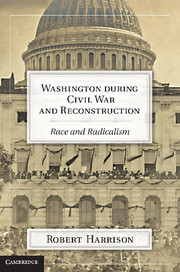Book contents
- Frontmatter
- Contents
- Abbreviations
- Foreword
- 1 Introduction
- 2 Wartime Washington
- 3 The Freedmen's Bureau in the District of Columbia
- 4 Congressional Reconstruction in the District of Columbia
- 5 Reconstructing the City Government
- 6 Race, Radicalism, and Reconstruction
- 7 A City and a State
- 8 From Biracial Democracy to Direct Rule
- 9 Reconstruction in the Nation's Capital
- Index
- References
3 - The Freedmen's Bureau in the District of Columbia
Published online by Cambridge University Press: 05 February 2012
- Frontmatter
- Contents
- Abbreviations
- Foreword
- 1 Introduction
- 2 Wartime Washington
- 3 The Freedmen's Bureau in the District of Columbia
- 4 Congressional Reconstruction in the District of Columbia
- 5 Reconstructing the City Government
- 6 Race, Radicalism, and Reconstruction
- 7 A City and a State
- 8 From Biracial Democracy to Direct Rule
- 9 Reconstruction in the Nation's Capital
- Index
- References
Summary
Introduction
On a summer's day in 1866, the citizens of New York were witnesses to an unfamiliar sight: a party of about sixty African Americans, whose garb and manner betrayed that they had not long been out of slavery, making their way across the city to the New Haven Railroad terminal.
Filing through the streets, the anxious wandering women dressed partly in neat garments given them, with others of their own selection in less good taste; while on the men an occasional damaged silk hat topped off a coat that would have made old Joseph's of old look plain; with iron-clad army shoes; or a half-worn wedding swallow-tail eked out by a plantation broad-brim, and boots too much worn for either comfort or beauty. This motley band, led by a gentle and spiritual-faced woman, will not soon be forgotten by those who saw it depart.
- Type
- Chapter
- Information
- Washington during Civil War and ReconstructionRace and Radicalism, pp. 60 - 108Publisher: Cambridge University PressPrint publication year: 2011



